
FACULTY OF ARTS AND SCIENCES
Department of Sociology
SOC 400 | Course Introduction and Application Information
| Course Name |
Status, Power and Welfare
|
|
Code
|
Semester
|
Theory
(hour/week) |
Application/Lab
(hour/week) |
Local Credits
|
ECTS
|
|
SOC 400
|
Fall/Spring
|
3
|
0
|
3
|
6
|
| Prerequisites |
None
|
|||||
| Course Language |
English
|
|||||
| Course Type |
Service Course
|
|||||
| Course Level |
First Cycle
|
|||||
| Mode of Delivery | - | |||||
| Teaching Methods and Techniques of the Course | - | |||||
| Course Coordinator | ||||||
| Course Lecturer(s) | ||||||
| Assistant(s) | - | |||||
| Course Objectives | The goal of this course is to provide students with the tools necessary for the analysis of status, power and welfare state. It, first, will focus upon one of the basic sociological principles that social groups are stratified according to class, status, and power, providing an overview of the field of social stratification. Then, it will turn to examine the consequences of social inequality by giving special attention to the relation between social inequality and poverty. And finally, the course will examine welfare politics and welfare state, especially with respect to the impact of welfare policies on poverty reduction. |
| Learning Outcomes |
The students who succeeded in this course;
|
| Course Description | This course examines the concepts of status, power and welfare from a sociological perspective. By studying the various theoretical approaches to class, status, power, poverty, and welfare, it explores a variety of topics that include class and changing class systems; social status; social power; techniques of power; social and economic inequality; social mobility; the causes and the persistence of poverty; the reduction and alleviation of poverty; welfare state; the effect of welfare policies on social inequality; and the impact of different type of welfare policies on different social groups. |
|
|
Core Courses | |
| Major Area Courses |
X
|
|
| Supportive Courses | ||
| Media and Management Skills Courses | ||
| Transferable Skill Courses |
WEEKLY SUBJECTS AND RELATED PREPARATION STUDIES
| Week | Subjects | Related Preparation |
| 1 | Course Introduction | |
| 2 | Class | Marx, K. “Classes in capitalism and Pre-Capitalism”, In D. B. Grusky (Ed.), Social Stratification: Class, Race, and Gender in Sociological Perspective, pp. 79- 97. Wright, E. O. “A General Framework for the Analysis of Class Structure” In D. B. Grusky (Ed.), Social Stratification: Class, Race, and Gender in Sociological Perspective, pp. 98- 110 Wallerstein, I. “Class Conflict in the Capitalist World Economy” In D. B. Grusky (Ed.), Social Stratification: Class, Race, and Gender in Sociological Perspective, pp. 111- 113. |
| 3 | Class and Status | Grusky, D. B. and Sorensen, J. “Are There Big Social Classes?” In D. B. Grusky (Ed.), Social Stratification: Class, Race, and Gender in Sociological Perspective, pp. 165- 175. Weber, M. “Class, Status, and Party”, “Status Groups and Classes” In D. B. Grusky (Ed.), Social Stratification: Class, Race, and Gender in Sociological Perspective, pp. 114- 127. Giddens, A. “The Class Structure of the Advanced Societies” In D. B. Grusky (Ed.), Social Stratification: Class, Race, and Gender in Sociological Perspective, pp. 132- 142. |
| 4 | Class and Status: Distinct Concepts? | Tak Wing Chan and John H. Goldthorpe. 2007. “Class and Status: The Conceptual Distinction and its Empirical Relevance” American Sociological Review 72: 512 Bourdieu, P. “Distinction: A Social Critique of the Judegement of Taste” In D. B. Grusky (Ed.), Social Stratification: Class, Race & Gender in Sociological Perspective, pp. 870- 892. Boyne, Roy. 2002. “Bourdieu: From Class to Culture In Memoriam Pierre Bourdieu 1930–2002” Theory, Culture & Society, Vol. 19(3): 117–128 . |
| 5 | Film Screening | Roma (Alfonso Cuaron) |
| 6 | The Emergence of a New Class? From the Proletariat to Precariat | Kalleberg, A.L. 2009. Precarious work, insecure workers: Employment relations in transition. American Sociological Review 74:1-22. Breman, J. and M. van der Linden. 2014. Informalizing the Economy: The Return of the Social Question at a Global Level. Development and Change 45:920-940. Munck, R. 2013. The Precariat: a view from the South. Third World Quarterly 34:747-762. |
| 7 | MIDTERM | |
| 8 | Power | Lukes, Steven. “Power: A Radical View” In S. Lukes, Power: A Radical View, pp. 14-59. |
| 9 | Power | Foucault, M. 1980a. Truth and power. In C. Gordon (Ed.) Power/Knowledge: Selected Interviews and Other Writings 1972-1977, pp.109-133. Foucault, M. 1980b. Power and strategies. In C. Gordon (Ed.) Power/Knowledge: Selected Interviews and Other Writings 1972-1977, pp. 134-145. |
| 10 | Power | Foucault, M. 1980c. Two lectures In C. Gordon (Ed.) Power/Knowledge: Selected Interviews and Other Writings 1972-1977, pp.78-108. Foucault, M. 1980d. The eye of power. In C. Gordon (Ed.) Power/Knowledge: Selected Interviews and Other Writings 1972-1977, pp.146-165. |
| 11 | Inequality and Poverty | Royce, Edward. 2009. Poverty and Power: The Problem of Structural Inequality. Lanham, MD: Rowman and Littlefield Publishers, pp. 1- 24. Townsend, P and D. Gordon. “Introduction: The human condition is structurally unequal”, In Peter Townsend and David Gordon (Eds.) World Poverty: New policies to defeat an old enemy (Policy Press, 2002) pp. xi- xxiv. |
| 12 | Welfare State | Briggs, Asa. “The Welfare State in Historical Perspective”, In C. Pierson and F. G. Castles (eds)., The Welfare State a Reader (Polity, 2006), pp. 16- 29. Offe, Claus. “Some Contradictions of the Modern Welfare State”, In C. Pierson and F. G. Castles (eds)., The Welfare State a Reader (Polity, 2006), pp. 66- 75. Hayek, F. V. “The Meaning of the Welfare State”, In C. Pierson and F. G. Castles (eds)., The Welfare State a Reader (Polity, 2006), pp. 90- 95 |
| 13 | Poverty and the Welfare State | Andersen, Gosta-Esping. “Three Worlds of Welfare Capitalism”, In C. Pierson and F. G. Castles (eds)., The Welfare State: a Reader (Polity, 2006), pp. 160- 174. Townsend, Peter. “Poverty, social exclusion and social polarisation: the need to construct an international welfare state”, In Peter Townsend and David Gordon (Eds.) World Poverty: New policies to defeat an old enemy (Policy Press, 2002) pp. 3- 24. |
| 14 | Future of the Welfare State and Anti-Poverty Policies | Andersen, Gosta-Esping. “A Welfare State for the Twenty-First Century”, In C. Pierson and F. G. Castles (eds)., The Welfare State a Reader (Polity, 2006), pp. 434- 454. Lister, Ruth. “Investing in the Citizen-Workers of the Future: Transformation in Citizenship and the State under New Labor”, In C. Pierson and F. G. Castles (eds)., The Welfare State a Reader (Polity, 2006), pp. 455- 472. Townsend, Peter and David Gordon. “Conclusion: constructing an anti-poverty strategy”, In Peter Townsend and David Gordon (Eds.) World Poverty: New policies to defeat an old enemy (Policy Press, 2002) pp. 413- 431. |
| 15 | Semester Review | |
| 16 | Final Exam |
| Course Notes/Textbooks | Must readings mentioned in this information sheet. |
| Suggested Readings/Materials | Documentary and movie screening. |
EVALUATION SYSTEM
| Semester Activities | Number | Weigthing |
| Participation | ||
| Laboratory / Application | ||
| Field Work | ||
| Quizzes / Studio Critiques | ||
| Portfolio | ||
| Homework / Assignments |
1
|
30
|
| Presentation / Jury | ||
| Project | ||
| Seminar / Workshop | ||
| Oral Exams | ||
| Midterm |
1
|
35
|
| Final Exam |
1
|
35
|
| Total |
| Weighting of Semester Activities on the Final Grade |
3
|
60
|
| Weighting of End-of-Semester Activities on the Final Grade |
1
|
40
|
| Total |
ECTS / WORKLOAD TABLE
| Semester Activities | Number | Duration (Hours) | Workload |
|---|---|---|---|
| Theoretical Course Hours (Including exam week: 16 x total hours) |
16
|
3
|
48
|
| Laboratory / Application Hours (Including exam week: '.16.' x total hours) |
16
|
0
|
|
| Study Hours Out of Class |
14
|
3
|
42
|
| Field Work |
0
|
||
| Quizzes / Studio Critiques |
0
|
||
| Portfolio |
0
|
||
| Homework / Assignments |
1
|
25
|
25
|
| Presentation / Jury |
0
|
||
| Project |
0
|
||
| Seminar / Workshop |
0
|
||
| Oral Exam |
0
|
||
| Midterms |
1
|
25
|
25
|
| Final Exam |
1
|
25
|
25
|
| Total |
165
|
COURSE LEARNING OUTCOMES AND PROGRAM QUALIFICATIONS RELATIONSHIP
|
#
|
Program Competencies/Outcomes |
* Contribution Level
|
||||
|
1
|
2
|
3
|
4
|
5
|
||
| 1 | To have the knowledge of classical and contemporary theories in sociology, and be able to comparatively analyze these theories. |
X | ||||
| 2 | To have the knowledge of main methodological approaches in sociology as well as social research and data analysis methods. |
X | ||||
| 3 | To have knowledge in the fields of general sociology, sociology of institutions, social structure and change, and applied sociology. |
X | ||||
| 4 | To be able to determine the appropriate methods in the design of the planning stage and conclusion of a sociological project, individually or as part of a team. |
X | ||||
| 5 | To be able to diagnose the social dynamics behind personal problems by using sociological imagination. |
X | ||||
| 6 | To be able to define social problems at local, national, and global level, and offer new policies for solutions. |
X | ||||
| 7 | To be able to apply commonly-used computer programs for data collection and analysis in sociological research. |
X | ||||
| 8 | To be able to develop a socially responsible, scientific and ethical perspective regarding the collection, analysis, interpretation and presentation of data. |
X | ||||
| 9 | To be able to analyze different aspects of the social world by drawing on the knowledge produced by other disciplines of the social sciences. |
X | ||||
| 10 | To be able to constantly renew herself/himself professionally by following scientific and technological developments in sociology and social research. |
X | ||||
| 11 | To be able to collect sociological data and communicate with sociologists and other social scientists in a foreign language ("European Language Portfolio Global Scale", Level B1). |
X | ||||
| 12 | To be able to speak a second foreign at a medium level of fluency efficiently. |
X | ||||
| 13 | To be able to relate the knowledge accumulated throughout the human history to their field of expertise. |
X | ||||
*1 Lowest, 2 Low, 3 Average, 4 High, 5 Highest
NEWS |ALL NEWS
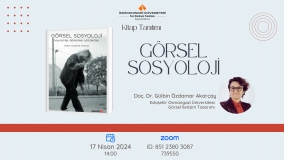
Book Presentation and Talk: Visual Sociology
Department of Sociology invites you to the Book Presentation and Talk event with Gülbin Özdamar Akarçay, the author of “Visual Sociology". Date:
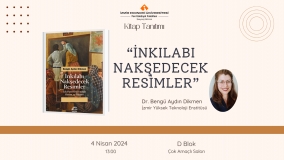
Book Presentation and Talk: Painting the Revolution
Department of Sociology invites you to the Book Presentation and Talk event with Dr. Bengü Aydın Dikmen, the author of “Painting the
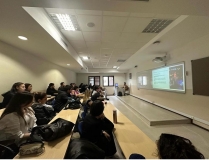
We welcomed ethnomusicologist Onur Sönmez.
We held our sociology seminar where we hosted ethnomusicologist Onur Sönmez. We thank him very much for this detailed and interesting presentation.
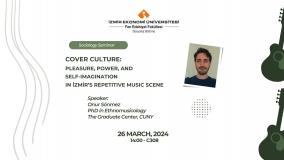
Cover Culture: Pleasure, Power, and Self-Imagination in İzmir’s Repetitive Music Scene
You are cordially invited to the Sociology Seminar where we will host Dr. Onur Sönmez. Onur Sönmez has a PhD in ethnomusicology
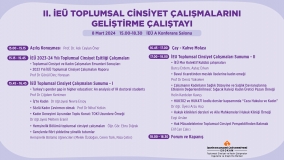
II. IUE GENDER STUDIES DEVELOPMENT WORKSHOP (EKOKAM- Gender and Women’s Studies Research and Application Center)
Research Assistant Helin Kardelen Kavuş attended the “II. IUE Gender Studies Development Workshop” on March 8, 2024, International Women's Day. Organized by EKOKAM, the workshop
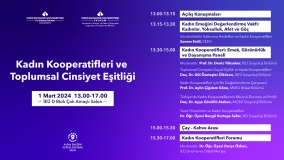
Women’s Cooperatives and Gender Equality
You are cordially invited to "Women's Cooperatives and Gender Equality", which will be co-organized by IUE EKOKAM, the Department of Sociology, and
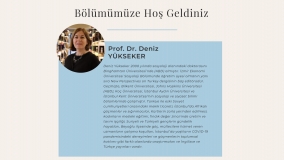
Welcoming Our New Faculty Member: Professor Deniz Yükseker
We are proud to welcome and introduce our newest faculty member: Professor Deniz Yükseker. We wish her all the best and success
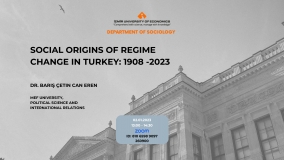
Sociology Seminar: Social Origins of Regime Change in Turkey: 1908 -2023
Department of Sociology cordially invites you to a seminar on "Social Origins of Regime Change in Turkey: 1908 - 2023" by Dr.



